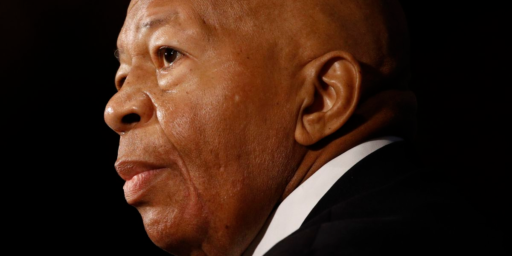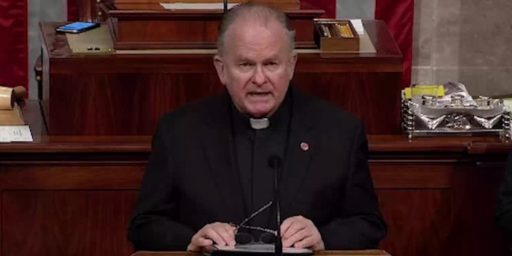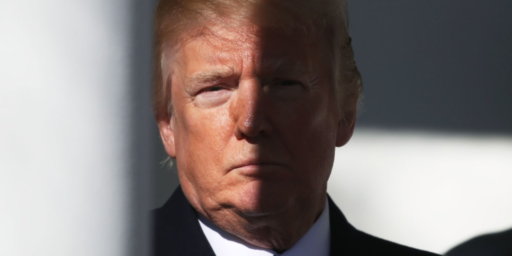I Guess There Are Atheists In Foxholes
Michael Cummings, an Army Captain who has served tours of duty in both Iraq and Afghanistan makes some interesting observations about the religious habits of his fellow soldiers:
“There are no atheists in foxholes,” the cliché goes. It’s hard to imagine a soldier facing death who doesn’t believe in God. Maybe soldiers need hope; maybe they need the promise of an afterlife to face death. And when this friendly little aphorism was coined, it was probably true.
Now, religion is political. Polls in the MilitaryTimes seem to back up the religiosity of the Armed Forces. So you’d be forgiven if you viewed that the battlefield was also a religious place — every base loaded with a friendly chaplain, every troop in a foxhole silently speaking to God and every platoon doubling as a prayer group.
Because you’d be wrong.
About a week after arriving at the Korangal Outpost — after being in Afghanistan a month — the First Sergeant announced that the chaplain had shown up. He would be holding a (nondenominational) Christian service later that night. I expected a big crowd. When I told my men this news, they groaned.
About 10 minutes before the ceremony, I trudged up the hill, through three feet of snow, from our hooch to the service. I wore the usual kit for winter — ACU pants, a brown T-shirt, a black fleece jacket, an IBA (Improved Ballistic Armor) and a helmet — I carried a Bible in my cargo pocket.
Our chapel was the Dining Facility, which for us meant an olive-drab tent and wood benches, freezing cold in the wintertime. The tent had the Army version of indoor lighting, which was floodlights aimed awkwardly at the ceiling, running off the diesel generator outside — the only sound on an otherwise silent FOB.
As I entered, I thought for a moment I was in the wrong place. It was empty, save for two other soldiers.
(…)
Two months later my platoon left the Korangal Outpost. Our new (temporary) home was the Fortress, so named for the 40-foot walls that enclosed its troops.
At the Fortress, the new First Sergeant announced the arrival of the chaplain. The same thing happened, except this time the dining facility had dry wall, refrigerators and heating. Three soldiers, myself included, showed up for a base twice as big. (The Korangal Outpost was small, about 60 people at any given time. The Fortress had twice that, if not more.)
Again, the chaplain smoothed things over, and gave inspiring talks for the gathered faithful.
I shouldn’t have been shocked. Even at the biggest Forward Operation Base in Afghanistan, Bagram Air Field, I attended a service with only about 30 other people. Thirty people out of a base of 30,000. In fact, the only religious ceremony I attended that did have a lot people was at an Air Force Base in Qatar, well away from the sands, IEDs and insurgencies of Iraq and Afghanistan. If there are no atheists in foxholes, then why aren’t there any religious soldiers on our bases?
Maybe war is too busy. After cleaning weapons, running eight-hour patrols, and avoiding getting shot, it is just easier to lie on your bed and watch a movie than go to church. Maybe it was just too cold. Maybe it got too hot. Maybe soldiers are individualistic and they don’t share their faith.
Cummings goes on to hypothesize that it’s because religion isn’t considered “cool” among the 20-somethings that make up most of the combat force, but I think it’s more than that. While polls have consistently shown that more than 90% of Americans say they believe in a higher power of some kind. At the same, time less than half of Americans say that they attend church services on a regular basis, a number that is down significantly from where it was fifty or sixty years ago. The rates of attendance are even lower among those aged 18-29 and 30-49. Clearly, while Americans may believe in a god some some kind, they aren’t necessarily as religious as they used to be, and that is being reflected among Cummings’ fellow soldiers.
And, yes, it’s probably also the case that there are in fact atheists in foxholes.






“Clearly, while Americans may believe in a god some some kind, they aren’t necessarily as religious as they used to be, and that is being reflected among Cummings’ fellow soldiers.”
Or maybe they are more religious than you suspect, which is hinted at in the sentence: “Maybe soldiers are individualistic and they don’t share their faith.” Afterall, it is taught in the bible:
Matthew 6:5-6: “And when thou prayest, thou shalt not be as the hypocrites are: for they love to pray standing in the synagogues and in the corners of the streets, that they may be seen of men….when thou prayest, enter into thy closet and when thou has shut thy door, pray to thy Father which is in secret….”
The notion of there being no atheists in foxholes was always a ridiculous notion – just propaganda from religious people. If anything, war experiences seem to raise the number of atheists – to the extent that those experiences equate to looking into the heart of darkness, seeing man’s inhumanity to man, seeing the best of a generation being wasted away…there are countless testimonials to how these experiences turn people away from religious fairy tales.
No one seems to think that war inspires a belief in god – the little aphorism is rooted rather in the perception of the great fear of imminent death and the grasping at straws when being at ones most vulnerable. That doesn’t even deserve to be counted as real belief, just desperation.
“…more than 90% of Americans say they believe in a higher power of some kind. At the same, time less than half of Americans say that they attend church services on a regular basis, ”
There you have it. Stating that you believe is the default position, given the great social pressures that one faces from family and other community. If you don’t want to have a lot of conflicts around the dinner table, just say – sure, there must be a god, I believe that. Often times you don’t even have to go to church, just saying that will cause people to leave you alone.
Others who don’t really believe are often compelled to do more, to go to church, if they want to have a certain standing in their community. Real belief is, I suspect, far smaller than the stats would tell you.
Too, there’s a big difference between being religious and manifesting that religiosity through a formal church. I know many who are true believers, but distance themselves from any religious organization. They’re content with their one-on-one relationship with a deity and don’t want to subscribe to whole packages offered by ‘churches’.
“They’re content with their one-on-one relationship with a deity ”
Ah yes, my own little personal god of my own making….
Is this a great country or what….?
I never liked that myth, and it`s downright offensive when you think about it. The implication is that soldiers can`t willingly face death without an “out” in the form of a guarantee of an afterlife, or a deity protecting.
FWIW, when I was in the Marines, the guys I served with didn’t seem all that interested in religion.In fact, given some of the things I saw, we were a pretty damned irreligious bunch.
Part of it may be that organized religion had become so heavily politicized (by both the right and the left) that an increasingly large number of people see services more as a form of political organizing rather than a genuine oppurtunity for spirtual community.
I thi k the fatigue factor has a lot to do with it. I retired from the Army in ’95, not really all that long ago, and on my last overseas tour – this a hardship tour, no families, to a low-intensity combat area – the chapel was full every Sunday, with the great majority being junior-rank soldiers. Has the religiousity of the troops changed all that much in just a few years, demographically speaking? I doubt it.
But I know that it has changed some. Young peope today are far more likely to describe themselves as “spiritual” than religious (about which I wrote more here), and contemporary research does show that the fastest-growing religious affiliation is, in fact, “no affiliation.” I wonder, too, whether facing a hyper-religious enemy whose violence is specifically sourced in their religion is a factor is discrediting religion generally in the eyes of the troops.
Finally, I am far from convinced that the quality of chaplain care today is is high as its been in the past (disclosure: I was an artillery officer, not a chaplain). For the last 50 years the mainline churches have disparaged, dismissed and scorned military service. I can state categorically that the largest Protestant denominations are completely indifferent, if not inimical, to the idea of sending a minister to the military. It is simply not on the scope for them and they frankly wonder what’s wrong with an ordinand who would want to.
The result is that chaplaincy is not seen a a productive career path for ministers, who even while chaplains on active duty still must retain credentials with their denomination and will need to find employment with the denominations after they leave the service, even if they retire from the military.
Individually, military chaplains may be skilled and are certainly devoted, but they are too few. In my earlier days of active duty, every battalion had a chaplain assigned to it alone, but nowadays the services are so short of chaplains that the ones they do have swoop in for a brief visit and then off they go. They are hardly every able to build relationships with the troops as they did before.
I think there are theological reasons, too – namely that mainline Protestant theology is pretty weak nowadays, offering worshipers not much more than mere ethical guidance, and that in a framework not much suited for military deployments. But if Christianity is nothing but ethics there’s darn little point to it, so why bother?
Frankly, if the military done away with the chaplain corp, I bet 90% of the members of the armed forces wouldn’t notice nor mind.
“The notion of there being no atheists in foxholes was always a ridiculous notion ”
I love the saying because I think it inadvertently reveals a deep truth- that organized religion is based entirely on fear. People who are afraid to die are easy suckers for the comforting lies peddled by charlatans claiming direct knowledge of the supernatural. If something appeals to you most stringly when you are terrified beyond belief and less when you can consider the matter rationally…well that means the thing is playing on your baser nature and is probably evil.